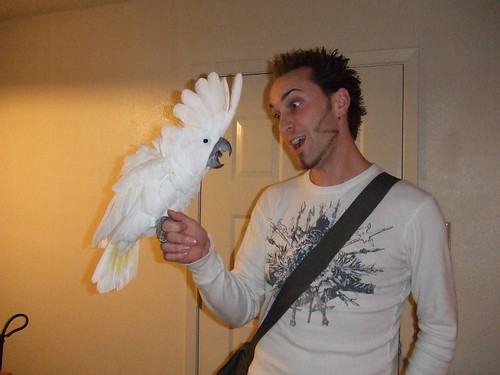
Parrots are instinctively highly attuned to everything around them. It is this awareness of their environment that keeps them safe from predators. So it’s easy to understand why parrots are so quick to pick up on the energy levels of their owners and the home they live in. This is something we can use to our advantage and is just one more example of how having an understanding of a wild bird’s nature will help us with the birds we keep in our homes.
Have you ever noticed that when you stand in front of your bird and act silly and animated that he will start bouncing up and down on his perch and become vocal? Have you observed that when you stand quietly and speak to him in quiet tones that he will turn his head to the side and listen intently to your words? The energy level present in the home is often responsible for the behavior, or misbehavior, of our parrots. If things have become too chaotic or noisy, sometimes all it takes to restore peace is a quiet chat. When Linus, my umbrella cockatoo, decides the time is right for his afternoon vocalizations, I can nearly always quiet him by speaking softly to him.
Even when he is in full-on scream mode, I can generally stop it by standing in front of him and continuing to speak quietly. He may not be able to hear me over his own loud voice, but he can see me, and I figure he has to come up for air at some point. My low energy gradually rubs off on him.

On the other side of that coin is instigating play. For the parrot that tends to be a perch potato, some music and lively dancing and singing on your part might be just the things to get him moving, and exercising. Sometimes birds are afraid of, or disinterested in, new things. Since your bird trusts you, your enthusiasm with new things will make him feel comfortable with, and an excitement about, the things you introduce him to.
Once you tell him something is okay, it will be. Talking to your parrot serves a number of purposes. For the new parrot in the home, it is trust building. Your new parrot can learn to feel relaxed with you as you continue to show him that you are a safe playmate. As his comfort increases, you can begin to show him that you are fun as well. Talking to your parrot can prepare him for events coming up in the future as well, such as your trip to Europe and his subsequent trip to the boarding facility, or any other big change that is approaching. Tell your parrot that a change is coming, but that it is a temporary arrangement and that everything will be fine.
Assure him that he is loved, and throw in how beautiful and good he is. The more time you spend talking to him, explaining and reassuring him, the better prepared he will be for your absence. I realize this sounds silly, and I can already see some eyes rolling, but this really does help, and I don’t know of a single parrot expert who doesn’t agree. While they don’t understand your words, they will certainly take your tone to heart. Somehow, this reaffirms your relationship with them and carries them through what might otherwise be a traumatic event.

In every case where a parrot that has the benefit of an owner that takes the time to talk to him, he will feel included as a member of the household. This improves your relationship with him, betters his life and will make him more family friendly.
Author Patty Jourgensen specializes in avian health, behavior and nutrition and has been working with and caring for rescue birds since 1987.



Be the first to comment